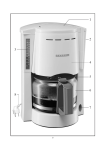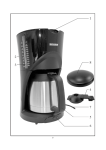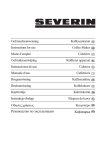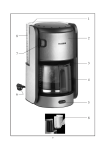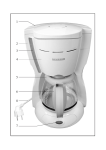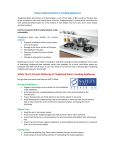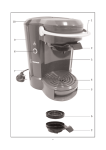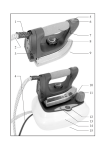Download Severin KA 4770
Transcript
1 8 2 7 3 4 6 5 8 9 3 Coffee Maker Dear Customer Before using the appliance, the user should read the following instructions carefully. ● Connection to the mains supply The appliance should only be connected to an earthed socket installed in accordance with the regulations. Make sure that the supply voltage corresponds with the voltage marked on the rating label. This product complies with all binding CE labelling directives. ● ● ● Familiarisation 1. Lid for water container 2. Swing-out filter with removable filter insert 3. Aroma protection lid 4. Heat-conserving carafe 5. On/Off switch 6. Power cord with plug 7. Swing-out filter release 8 Water container (removable) 9. Screw-in lid ● ● ● Important safety instructions ● Before the appliance is used, the main body as well as any attachment fitted should be checked thoroughly for any defects. Should the appliance, for instance, have been dropped onto a hard surface, it must not be used any longer: even invisible damage may have adverse effects on the operational safety of the appliance. ● During operation, the coffee maker must be placed on a level, non-slip surface, impervious to splashes and stains. ● Do not allow the appliance or its power cord to touch hot surfaces or to come into contact with any heat sources. ● Do not leave the appliance unattended while in use. ● To prevent the danger of hot water or ● steam being emitted, always switch off the coffee maker and allow sufficient time for the appliance to cool down before it is opened or any accessories or attachments are removed. Always remove the plug from the wall socket - in case of any malfunction, - after use, and also - before cleaning the appliance. When removing the plug from the wall socket, never pull on the power cord; always grip the plug itself. Do not allow the power cord to hang free; the cord must be kept well away from hot parts of the appliance. This appliance is not intended for use by any person (including children) with reduced physical, sensory or mental capabilities, or lacking experience and knowledge, unless they have been given supervision or instruction concerning the use of the appliance by a person responsible for their safety. Children should be supervised to ensure that they do not play with the appliance. This appliance is intended for domestic use only and not for commercial applications. No responsibility will be accepted if damage results from improper use, or if these instructions are not complied with. In order to comply with safety regulations and to avoid hazards, repairs of electrical appliances must be carried out by qualified personnel, including the replacement of the power cord. If repairs are needed, please send the appliance to one of our customer service departments. The addresses can be found in the appendix to this manual. Before using for the first time Before making coffee for the first time, let the appliance go through two or three filtration cycles using the indicated maximum amount of cold water, but without using ground coffee. This should also be 8 done if the appliance has not been used for an extended period of time, and after descaling. and then place the carafe into the appliance. If correctly inserted, the lid will disable the drip-stop mechanism in the filter holder during the brewing cycle. - Starting the brewing cycle: Insert the plug into a suitable wall outlet and use the On/Off switch to switch the coffee maker on. The filtration cycle starts and the water passes through the filter. - Removing the glass carafe: Wait until all the water has passed through the filter before the carafe is removed from the appliance. To keep the coffee hot for as long as possible, remove the aroma protection lid and use the screw-in lid to close the carafe. - Switching off the coffee maker: Always switch off the appliance after use and remove the plug from the wall socket. General information - A measuring scale on the water container facilitates filling the container with the correct amount of clean water. With a dual-scale, the left scale is used for regular-sized cups of approx.125ml, while the right scale is used for smaller cups. Make sure that the indicated maximum amount of water is not exceeded. ● Do not remove the water container unless the appliance has been switched off. This will prevent damage to the heating element. ● If several consecutive brewing cycles are required, switch off the coffee maker after each cycle and let the appliance cool down for approx. 5 minutes. ● Important note: When filling the appliance with fresh water shortly after a brewing cycle is completed, there is a danger of scalding from hot water or steam escaping through the water outlet. Heat-retaining carafe - For technical reasons the screw-in lid does not close hermetically. Therefore always hold the carafe in an upright position when filled with coffee. - Keeping the coffee hot: A heatconserving carafe accumulates heat energy. Therefore the carafe should preferably be filled to its maximum capacity. If it is only partly filled, the temperature will not be held as efficiently. If you rinse out the carafe with hot water before use, the coffee will be kept warm for a longer time. Making coffee - Filling with water: Use the grip recess on the water container and lift it out. Open the lid, fill the container with the desired quantity of water and replace the lid. Replace the container in the appliance and push it down in to open the valve in the bottom. - Inserting the paper filter: Open the swing-out filter by pressing the filter release and insert a size-4 paper filter into the filter holder, first folding down the perforated sides of the filter. - Filling with ground coffee: For each regular-sized cup (125ml), a measure of about 6 g (= 11/2 - 2 teaspoons) of medium or finely ground coffee will be required. Close the swing-out filter afterwards, ensuring that it locks into place. - Preparing the glass carafe: Fit the aroma protection lid onto the carafe, The interior of the heat-retaining carafe insert consists of high quality double-walled glass with a vacuum in-between for better insulation. Any streaks or bubble marks inside the carafe looking like bubbles or scratches do not affect its functional use nor its heat-retaining ability. In case the glass is damaged for one or the other reason as mentioned below, there is a risk that the glass carafe implodes. This might happen quite some time after the glass carafe has actually been damaged. ● Therefore do not drink out of the carafe 9 and do not put your hand into it. Always close the carafe with its screw cap. The coffee can be poured out easily by half a turn of the cap, without removing the cap. Do not leave the vacuum carafe unattended near where children may reach it. coffee, and let the appliance run through one filtration cycle. Repeat the procedure if necessary. During descaling, ensure sufficient ventilation and do not inhale any vinegar vapours. - To clean the appliance after descaling, let it run through 2-3 filtration cycles using clean water only. - Do not pour descalers down enamel sinks. To prevent damage to the glass carafe: - Avoid shocks and great differences in temperature. - Do not stir in the carafe, for example with a metal spoon. - Do not use hard brushes or abrasive cleaning agents. - Do not wipe the inside with a cloth. Dust particles may cut the glass (similar to a glass-cutter). - Do not wash in a dishwasher. - Do not use in a microwave oven. Cleaning and care ● Before cleaning the appliance, ensure it is ● ● Descaling ● Depending on the water quality (lime content) in your area as well as the frequency of use, all thermal household appliances using hot water need descaling (i.e. removal of lime deposits) on a regular basis to warrant proper functioning. ● A lengthening of the brewing time and increased noise during brewing indicate that descaling of the coffee maker has become necessary. ● An excessive build-up of lime deposits is very difficult to remove, even when strong descaling agents are used. It may also cause the brewing system to leak. We therefore strongly recommend descaling the appliance after each thirty to forty brewing cycles. For descaling, a vinegar solution may be used as follows: - Mix 2-3 tablespoons of vinegar with the indicated maximum amount of cold water. - Pour the descaling solution into the water container, insert a paper filter into the filter holder without adding any ground coffee as described in section Making - ● - 10 disconnected from the power supply and has cooled down completely. To avoid the risk of electric shock do not immerse the coffee maker in water. The appliance may be cleaned with a slightly damp cloth, using a mild detergent. Wipe dry afterwards. Do not use abrasives or harsh cleaning solutions. To remove the used ground coffee, open the swing-out filter by pressing the filter release, and lift out the filter insert. Dispose of the ground coffee (as a natural substance, it may be composted). Rinse out the filter insert before it is replaced. Replace the filter in such way that the grip area sits properly in the recess on the swing-out filter. Close the swing-out filter, ensuring that it locks into place. Do not dismantle the carafe, do not wash in a dishwasher and do not immerse it in water. Rinse the inside of the carafe with water and wipe the outside with a clean damp cloth after use. To remove coffee deposits from the inside of the carafe, fill it with hot water and add a teaspoon of dishwasher detergent. Close the screw-in lid and leave the carafe for some hours. Rinse out thoroughly with water afterwards. Disposal Do not dispose of old or defective appliances in domestic garbage; this should only be done through public collection points. Guarantee This product is guaranteed against defects in materials and workmanship for a period of two years from the date of purchase. Under this guarantee the manufacturer undertakes to repair or replace any parts found to be defective, providing the product is returned to one of our authorised service centres. This guarantee is only valid if the appliance has been used in accordance with the instructions, and provided that it has not been modified, repaired or interfered with by any unauthorised person, or damaged through misuse. This guarantee naturally does not cover wear and tear, nor breakables such as glass and ceramic items, bulbs etc. If the product fails to operate and needs to be returned, pack it carefully, enclosing your name and address and the reason for return. If within the guarantee period, please also provide the guarantee card and proof of purchase. 11





